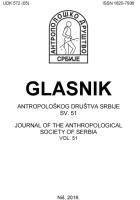Self-efficacy and health behaviour: some implications for medical anthropology
Self-efficacy and health behaviour: some implications for medical anthropology
Self-efficacy and health behaviour: some implications for medical anthropology
Author(s): Ljubiša ZlatanovićSubject(s): Anthropology
Published by: Антрополошко друштво Србије
Keywords: self-efficacy, health behaviour; health psychology; medical anthropology.
Summary/Abstract: The study of personality characteristics and behaviours related to human health hasbecome a key area of research within contemporary health psychology. Personalityvariable that has attracted a growing interest of health psychologists is the concept ofself-efficacy developed by Albert Bandura within his highly influential social-cognitive or social learning theory of human behaviour. Defined generally as the individual’s belief that one will be able to carry out one’s plans and intentions successfully or to perform certain behaviours necessary to attain desired goals or anticipated outcomes, selfefficacy is one of the key factors in the exercise of personal control, including a control over the state of one’s own health. Starting from this theoretical framework, the main purpose of this article is to provide at first a concise overview of the theory of selfefficacy, and then to consider its relationship with the various forms or patterns of behaviours related to health, as well as to suggest some possible implications of thistheory for medical anthropology – especially for its applied areas that are focused onthe health education, health promotion, and health protection.
Journal: Glasnik Antropološkog društva Srbije
- Issue Year: 51/2016
- Issue No: 1-2
- Page Range: 17-25
- Page Count: 9
- Language: English

